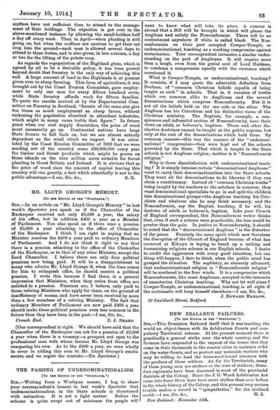THE PASSING OF UNDENOMINATIONALISM. [To ,I12 EDITOR or Ts. nEPECT.01.1
Stit,—Writing from a Wesleyan manse, I beg to share your correspondent's lament in last week's Spectator that undenominationalism in the State schools is threatened with extinction. It is not a light matter. Before the scheme is quite swept out of existence the people will want to know what will take its place. A rumour is abroad that a Bill will be brought in which will please the Anglican and satisfy the Nonconformist. There will be no contentment anywhere if white is called black. The Non- conformists on their part accepted Cowper-Temple, or undenominational, teaching as a working compromise against sectarianism. Your correspondent intimates a similar under- standing on the part of Anglicans. It will require more than a laugh, even from the genial soul of Lord Haldane, to condemn a compromise equally with the extremes which occasioned it What is Cowper-Temple, or undenominational, teaching? It consists, if I may quote the admirable definition from Durham, of "common Christian beliefs capable of being taught as such" in schools. That is, it consists of truths which are common alike to Anglicans and the several denominations which comprise Nonconformity. But it is not all the beliefs held on the one side or the other. The Anglican has his Catechism and his distinctive views of the Christian ministry. The Baptista, for example, a con- spicuous and influential section of Nonconformity, have their views on adult, or believer's, baptism. These and other dis- tinctive doctrines cannot be taught at the public expense, but only at the coat of the denominations which hold them. By common consent—this was the essence of the " undenomi- national" compromise—they were kept out of the schools provided by the State. That which is taught in the State schools is not Anglican religion ; neither is it "Nonconformist religion."
Why is there dissatisfaction with undenominational teach- ing? It is simply because certain "denominational Anglicans" want to carry their denominationalism into the State schools. They want all the denominations to do likewise if they can claim a constituency. Instead of "common Christian truths" being taught by the teachers to the scholars in common, they want denominational specialists to go in and split the children into denominational groups—the Anglican teaching his Cate- chism and whatever else he may think necessary, and the Nonconformist, say the Baptist, teaching, if ho will, his doctrine of adult, or believer's, baptism. Like your Church of England correspondent, this Nonconformist writer thinks that, even if such a scheme were practicable, the loss would be greater than the gain. In justice to Nonconformity, it should be noted that the " denominational Anglican" is the disturber of the peace. Precisely the same spirit which now threatens the disruption of the Church of England because of what has occurred at Kikuyu is trying to break up a uniting and humanising religious scheme in our English schools. 1 desire to credit the aggressors with every good intention, but one thing will happen, I dare to think, when the public mind Lao grasped the situation. The sophistry, so sincerely advanced, that undenominational religion is "Nonconformist religion" will be scattered to the four winds. It is a compromise which Nonconformists, like most Anglicans, accepted in the interests of unseetarian Christian teaching. Why not let well alone ? Cowper-Temple, or undenominational, teaching is all right if the ecolesiastio will busy himself elsewhere-1 am, Sir, Am., 80 Cauldwell Street, Bedford.
J. EDWARD HARLOW.






































 Previous page
Previous page